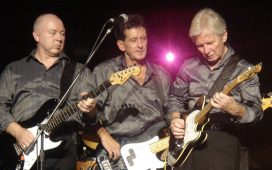The word “R.A.D.I.C.A.L.” sits at the back of the stage, each white letter punctuated by a coloured strobe lamp. The moniker chosen by the man born Kwadwo Adu Genfi Amponsah gives him a lot to live up to, but fortunately this emerging London rapper, currently winding up a sold-out UK tour, is a one-off in many ways.
Few of today’s crop of UK wordsmiths started their creative lives at the London College of Fashion studying drawing, but Radical did: he got a first. He recently designed bottles for some high-end tequila brand whose previous visuals have incorporated work by Keith Haring and Jean-Michel Basquiat.
Tonight, Radical is wearing a fashion-forward black bin liner on the top half of his body. “Beneath the torso” (to borrow one of Radical’s lyrics), he sports cargo trousers that don’t go the distance. They split open at the crotch just a couple of songs into this action-packed, emotional gig. He owns up to the wardrobe malfunction and strips off next to the monitor sound desk, joking about costume changes.
Radical is unusual in other ways, too. Before he was a visual artist he was a physical one, having trained as a dancer from the ages of 10 to 19. Although his commitment to discussing race, love, mental health and existential struggles in novel ways have elicited comparisons to US rapper Kendrick Lamar, there is usually a physical component to how Radical presents his music that is just as lyrical as the words – one that throws up parallels to FKA twigs, a fellow dancer-turned‑leftfield vocalist whose body sings the songs as much as her vocal cords.
He dances – in part, as a way of metabolising depression and anxiety – and talks about dance, a lot. “Yeah, keep dancing,” intoned Michaela Coel – of Chewing Gum fame – on Super Human, a key, moving track off Radical’s previous EP, 2017’s In Gods Body. On that track, it seemed like dancing possibly cut both ways for Radical: as one of the aspects of the black experience that white society finds aesthetically laudable, and as a practice in which succour or a state of grace could genuinely be found.
Or, as Radical puts it tonight, while having a breather: “I like to dance, man! Life is short and people suck…” He catches himself: “apart from the people in this room!”
Whether he is charging about furiously during the set’s hyper-masculine grime phase, or unleashing nimble retro-funk micro-gestures later on, Radical moves like mercury: fluidly, with a shimmer. For 2020, one of the night’s peaks, he kicks off his shoes and springs to the top of a speaker stack, commanding the moshpit to swirl harder.
There’s more to distinguish this uncommon artist. For this current run of dates following his recent mini-album, Cashmere Tears, tickets cost just £3. Mid-set, Radical talks about the heated discussions behind the scenes to keep his prices that low. He’ll forgo a tour bus, he says, and get the train to Glasgow (as he did the previous week) to keep his inventive, category-dicing music accessible. A deal with Asylum/Atlantic Records means that there are probably more layers of middle-management to argue with than when he was independent. But that low ticket price shores up the notion that Kojey Radical is an artist intent on disseminating more than ear candy. Cashmere Tears is his most accessible work to date, having amassed 1.9m global streams since last week. “Man upon a mission, still a martyr for the vision,” runs Where Do I Begin, the night’s first tune and the album opener.
You rightly come to this multidisciplinary artist’s gigs not quite knowing what to expect. What actually unfolds tonight is possibly the least likely scenario: a banging gig with a full band in which this former spoken-word artist – who started doing music, disguised as a series of sound installations, at college – fully embraces a new role: that of a rapper flexing his musicality.
Perhaps Kojey Radical’s most straightforwardly mainstream moments thus far have been his two collaborations with the up-and-coming singer Mahalia. She’s not here tonight to sing her sections, but the crowd know all the words, and two backing vocalists sub in just fine. Radical runs through Water, last year’s hard-hitting, nuanced meditation on racism, which starts angry and accusatory but ends up sweeter and jazzier. A segue finds Radical reprising his guest spot on Mahalia’s One Night Only, which in turn interpolates an ancient Jay-Z track that features Pharrell Williams, Excuse Me Miss. The band can do it all – grime, old-school rap, soul – and the crowd follow willingly.

The energy undoubtedly peaks when Radical is at his most east London. The grime MC Ghetts turns up for their collaboration with Shy FX, Bad After We, which features on the trailer for the last series of Top Boy, trading verses with Radical while the band come out from behind their instruments and go wild. To all intents and purposes, this is a grime night out.
But there is considerable yin to all this yang male physicality as well, especially when virtually every member of Radical’s entourage comes on to hug him later on, as he talks about the enduring impact of the loss of his friend, the model Harry Ukoza, who was the victim of knife crime in 2018. Eleven is the track on Cashmere Tears that most explicitly references Ukoza, but it packs in more than sorrow: there’s gratitude, love for Radical’s family, and a funky, jazzy roll that contrasts with the arty spikiness of his earlier work.
You can see why he’s morphing into more of a traditional – if versatile – rapper, scattering verses on a number of tracks in the two years since In Gods Body. Grime is in a good place right now, and Radical is a more sophisticated lyricist than many. Crucially, though, he foregrounds vulnerability in tandem with more familiar hip-hop tropes. Partway through the set, he explains why he called the album Cashmere Tears. As a man, he says he found it hard to cry when his feelings became too turbulent. (One of the pivotal tracks, Can’t Go Back, deals with depression specifically.)
As Radical tells it tonight, tears seemed to him a luxury, something inaccessible. Hence the leap to high-end fabrics – and a funky, sultry title track that channels a smidge of Prince, a soupçon of Pharrell and perhaps a hint of André 3000. Radical announced the album’s release on his Instagram thus: “May every tear feel like cashmere on your skin and let your ego fall like silk.” He may strike the poses of a more conventional rapper tonight, but Kojey Radical’s message remains distinctly refined.
This article contains affiliate links, which means we may earn a small commission if a reader clicks through and makes a purchase. All our journalism is independent and is in no way influenced by any advertiser or commercial initiative. By clicking on an affiliate link, you accept that third-party cookies will be set. More information.














